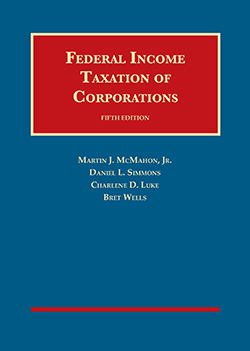- Home
- Federal Income Taxation of Corporations
Federal Income Taxation of Corporations
The 5th Edition explores the federal income taxation of corporations and their shareholders and can be used in a variety of courses covering corporate taxation at either the J.D. or LL.M. level. Numerous important revisions to the statutory structure over the past few decades—the changing magnitude of the capital gain preference, the preferential rate for dividends, the 2017 reduction to the corporate tax rate, a maximum individual rate now substantially higher than the maximum corporate rate, and repeal of the General Utilities rule providing nonrecognition of gain upon the distribution of property by a corporation—have changed dramatically the important issues. Most chapters and sections of chapters are introduced by a textual discussion or outline of the basic issues and structure of the statute governing treatment of the particular item or transaction covered in the chapter or section. This is followed by a principal case reading, generally a judicial decision but sometimes an IRS ruling or legislative history excerpt. A Detailed Analysis follows the principal case reading and is intended to facilitate the professor’s ability to tailor the class to the needs of a particular course through selecting portions of that analysis. Class Discussion Problems are incorporated directly into the text. In selecting and organizing the materials, we have attempted to maximize the usefulness of these materials for whatever approach the professor wishes to adopt—an intensive technical analysis, a problem-oriented method, a consideration of the policies that underlie the technical tax structure, or a survey of the principal elements of the federal income taxation of corporations.
Imprint: Foundation Press
Series: University Casebook Series
Publication Date: 08/16/2019
Martin J. McMahon Jr., University of Florida College of Law
Daniel L. Simmons, University of CA-Davis School of Law
Charlene D. Luke, University of Florida College of Law
Bret Wells, University of Houston Law Center
CasebookPlus™
This title is available in our CasebookPlus format. CasebookPlus provides support beyond your classroom lectures and materials by offering additional digital resources to you and your students. Anchored by faculty-authored formative self-assessments keyed to our most popular casebooks, CasebookPlus allows students to test their understanding of core concepts as they are learning them in class – on their own, outside of the classroom, with no extra work on your part. CasebookPlus combines three important elements:
- A new print or digital casebook
- Access to a downloadable eBook with the ability to highlight and add notes
- 12-month access to a digital Learning Library complete with:
- Chapter questions keyed to the casebook
- Black Letter Law questions (available in select subjects)
- Subject area review questions for end of semester use
Leading digital study aids, an outline starter, and audio lectures in select subjects
Students can still utilize CasebookPlus digital resources if they’ve purchased a used book or are renting their text by purchasing the Learning Library at westacademic.com.
With CasebookPlus, you can customize your students’ learning experience and monitor their performance. The quiz editor allows you to create your own custom quiz set, suppress specific quiz questions or quiz sets, and time-release quiz questions. Additionally, the flexible, customized reporting capability helps you evaluate your students’ understanding of the material and can also help your school demonstrate compliance with the new ABA Assessment and Learning Outcomes standards.
New for this edition:
- Updates for the 2017 Tax Cuts & Jobs Act, including
- complete analysis and integration of the flat 21% corporate tax rate,
- discussion of § 199A for S corporation shareholders,
- review of multiple other changes, such as § 163(j) and § 461(l).
- Emphasizes clearly and systematically the step-transaction doctrine and the interplay of substance and form.
- Includes problem sets in casebook rather than in separate problem book.
- Restructures chapters on acquisitive and divisive reorganizations to streamline and update for recent developments.
Learn more about this series.
Access Denied
Law School Faculty - Sign in or Create an Account to access this content. Law faculty who have created an account can sign in after receiving email notification that registration has been approved. Email accountmanager@westacademic.com or call 800-313-9378 for assistance.
Other Higher Education Faculty who wish to access digital review copies or teaching resources should contact their West Academic Account Manager at college@westacademic.com or 800-360-9378.
Adopters Only
This content is intended for adopters only. Sign in or Create an Account to access this content. Law faculty who have created an account can sign in after receiving email notification that registration has been approved. If you are an adopter who is unable to access this content after signing in, contact your account manager for assistance at accountmanager@westacademic.com or call 800-313-9378 for assistance.
Access Denied
Sign in or Create an Account to access this content. Faculty who have created an account can sign in after receiving email notification that registration has been approved. Contact us for assistance.
Law School Faculty: email accountmanager@westacademic.com or call 800-313-9378.
Other Higher Education Faculty: email college@westacademic.com or 800-360-9378.
Access Denied
Higher education faculty who wish to view this document should contact their West Academic Account Manager at college@westacademic.com or 800-360-9378.
